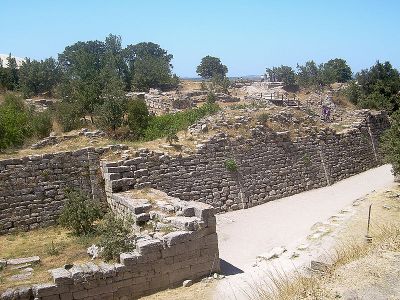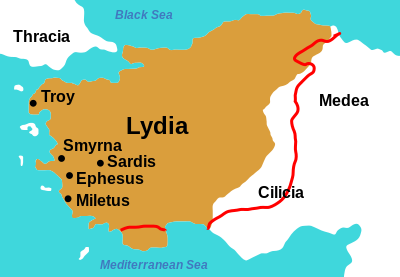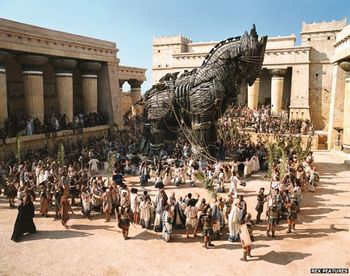Troy
| Author: Dayanand Deswal |

.
Troy (Greek: Τροία, Troia, Ilion, or λιος; Latin: Trōia and Īlium; Hittite: Wilusha or Truwisha; Turkish: Truva or Troya) was a city situated in the far northwest of the region known as Asia Minor, now known as Anatolia in modern Turkey.
Contents
Variants
- Troy (Anabasis by Arrian,p. 332.)
Brief description
Troy was the venue of the Trojan War described in the Greek Epic Cycle, in one of the two epic poems attributed to Homer - Iliad and Odyssey. Metrical evidence from the Iliad and the Odyssey suggests that the name Ἴλιον (Ilion) formerly began with a digamma: Ϝίλιον (Wilion); this is also supported by the Hittite name for what is thought to be the same city, Wilusa.
Troy was added to the UNESCO World Heritage list in 1998.
The words Trojan and Trojans mean something belonging to Troy, or the people of Troy.
Ancient Greek historians variously placed the Trojan War in the 12th, 13th, or 14th centuries BC. Herodotus has opined the war to have taken place in 1250 BC.
In the Iliad, the Achaeans set up their camp near the mouth of the River Scamander (presumably modern Karamenderes), where they had beached their ships. The city of Troy itself stood on a hill, across the plain of Scamander, where the battles of the Trojan War took place. The site of the ancient city is some 5 km from the coast today, but 3,000 years ago the mouths of Scamander were much closer to the city, discharging into a large bay that formed a natural harbor and which has since been filled with alluvial material. Recent geological findings have permitted the identification of the ancient Trojan coastline, and the results largely confirm the accuracy of the Homeric geography of Troy.
The Trojan War
In Greek mythology, the Trojan War was waged against the city of Troy by the Achaeans (Greeks) after prince Paris of Troy took Helen from her husband Menelaus, king of Sparta. The war is one of the most important events in Greek mythology and has been narrated through many works of Greek literature, most notably through Homer's Iliad. The Iliad relates four days in the tenth year of the decade-long siege of Troy; the Odyssey describes the journey home of Odysseus, one of the war's heroes. Other parts of the war are described in a cycle of epic poems, which have survived through fragments. Episodes from the war provided material for Greek tragedy and other works of Greek literature, and for Roman poets including Virgil and Ovid.
The Trojan Horse
The Trojan Horse is a tale from the Trojan War about the subterfuge that the Greeks used to enter the city of Troy and win the war. In the canonical version, after a fruitless 10-year siege, the Greeks constructed a huge wooden horse, and hid a select force of men inside. The Greeks pretended to sail away, and the Trojans pulled the horse into their city as a victory trophy. That night the Greek force crept out of the horse and opened the gates for the rest of the Greek army, which had sailed back under cover of night. The Greeks entered and destroyed the city of Troy, ending the war.
Metaphorically a "Trojan Horse" has come to mean any trick or stratagem that causes a target to invite a foe into a securely protected bastion or place.
Trojan Horse - the Computer Virus
A malicious computer program which tricks users into willingly running, is also called a Trojan horse.[1]
Helen of Troy
In Greek mythology, Helen of Troy, also known as Helen of Sparta, or simply Helen, was the daughter of Zeus and Leda, and was a sister of Castor, Pollux, and Clytemnestra. In Greek myths, she was considered the most beautiful woman in the world. By marriage she was Queen of Laconia, a province within Homeric Greece, the wife of King Menelaus. Her abduction by Prince Paris of Troy brought about the Trojan War. Elements of her putative biography come from classical authors such as Aristophanes, Cicero, Euripides and Homer (both The Iliad and The Odyssey).
Helen is the character of so many story books, novels and feature films. Helen of Troy feature film (released in 1956) under the banner of Warner Bros., in CinemaScope and based on Homer's Illiad and Odyssey, is most famous.
External Links
- https://en.wikipedia.org/wiki/Troy
- Archaeological city of Troy - UNESCO website
- https://en.wikipedia.org/wiki/Helen_of_Troy_(film)

